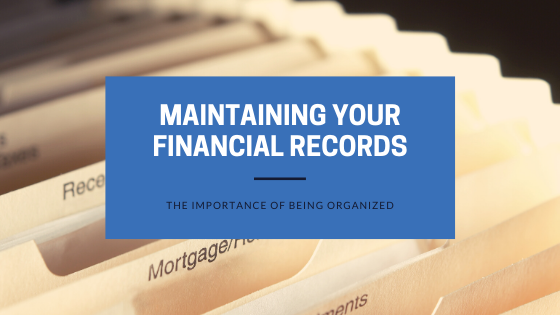

An important part of managing your personal finances is keeping your financial records organized. Whether it’s a utility bill to show proof of residency or a Social Security card for wage reporting purposes, there may be times when you need to locate a financial record or document–and you’ll need to locate it relatively quickly.
By taking the time to clear out and organize your financial records, you’ll be able to find what you need exactly when you need it.
What should you keep?
If you tend to keep stuff because you “might need it someday,” your desk or home office is probably overflowing with nonessential documents. One of the first steps in determining what records to keep is to ask yourself, “Why do I need to keep this?” Documents you should keep are likely to be those that are difficult to obtain, such as:
• Tax returns
• Legal contracts
• Insurance claims
• Proof of identity
On the other hand, if you have documents and records that are easily duplicated elsewhere, such as online banking and credit-card statements, you probably do not need to keep paper copies of the same information.
How long should you keep your
records?
Generally, a good rule of thumb is to keep financial records and documents only as long as necessary. For example, you may want to keep ATM and credit-card receipts only temporarily, until you’ve reconciled them with your bank and/or credit-card statement. On the other hand, if a document is legal in nature and/or difficult to replace, you’ll want to keep it for a longer period or even indefinitely.
Some financial records may have more specific timetables. For example, the IRS generally recommends that taxpayers keep federal tax returns and supporting documents for a minimum of three years up to seven years after the date of filing. Certain circumstances may even warrant keeping your tax records indefinitely. Listed below are some recommendations on how long to keep specific documents:
Records to keep for one year or less:
• Bank or credit union statements
• Credit-card statements
• Utility bills
• Auto and homeowners Insurance policies
Records to keep for more than a year:
• Tax returns and supporting documentation
• Mortgage contracts
• Property appraisals
• Annual retirement and investment statements
• Receipts for major purchases and home
improvements
Records to keep indefinitely:
• Birth, death, and marriage certificates
• Adoption records
• Citizenship and military discharge papers
• Social Security card
Keep in mind that the above recommendations are general guidelines, and your personal circumstances may warrant keeping these documents for shorter or longer periods of time.
LPL Tracking # 1-499439

